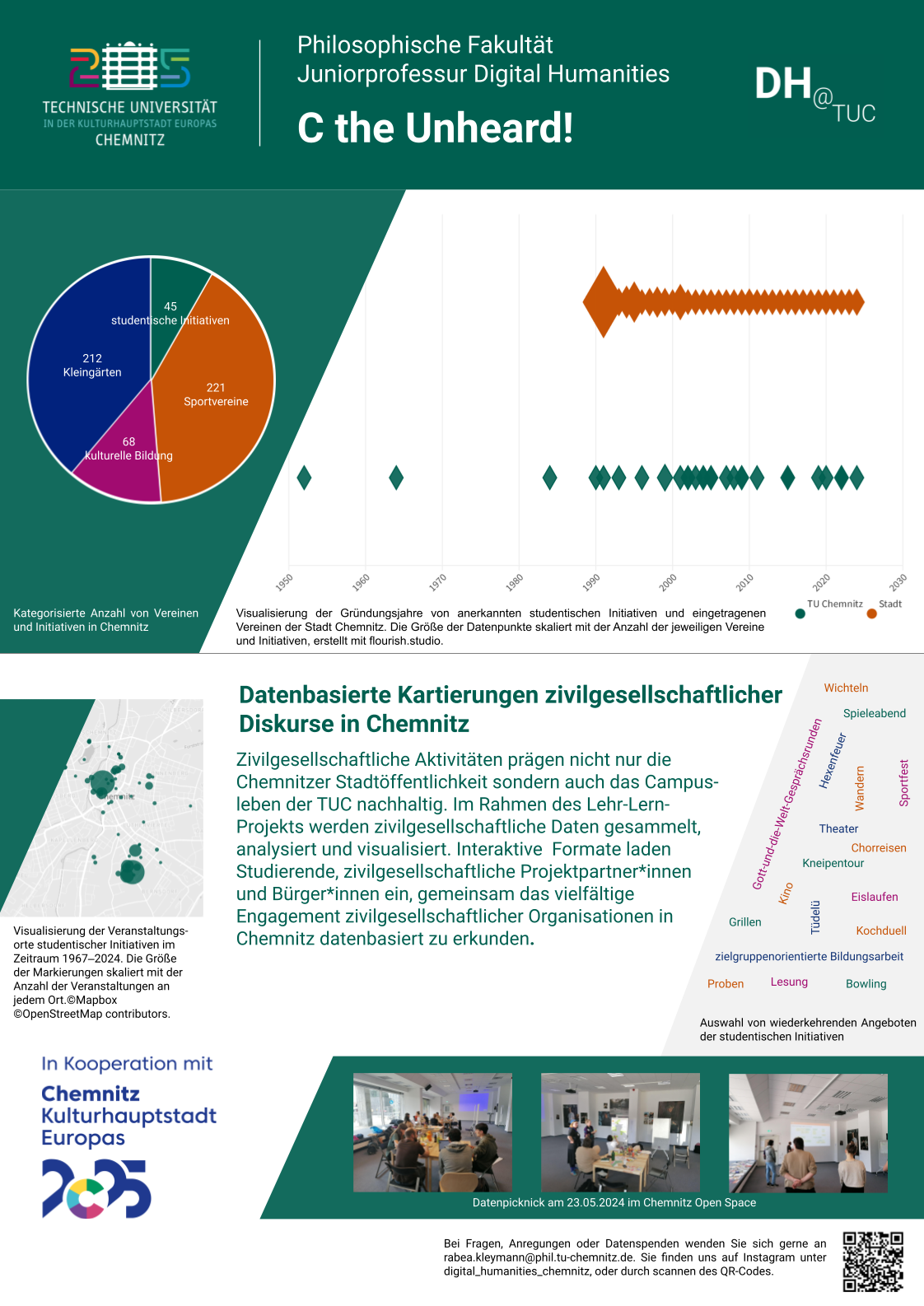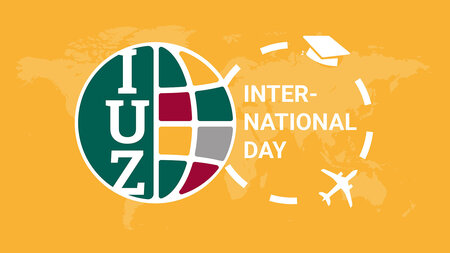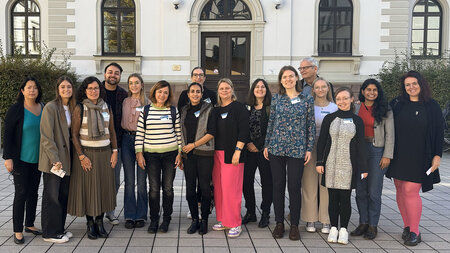Projects
Here you will find an overview of the junior professorship's current research projects.
C the Unheard!
Project period: March-December 2024
External project partners: Chemnitz Open Space
Funding: The project is funded as part of TUCculture2025, an independent initiative of Chemnitz University of Technology in the context of the European Capital of Culture Chemnitz 2025.
The project is dedicated to a data-based mapping of civil society discourses in Chemnitz. Civil society activities not only have a lasting impact on Chemnitz's public life, but also on campus life at the TUC. To date, there is no data collection that documents and visualises the diverse engagement of civil society actors. This is where the project comes in with the creation of an open data collection, which is being developed and explored with civil society project partners, students and citizens.

This poster was created for the exhibition TUCculture2025 on September 23, 2024, at the University Library. It is one of 20 posters highlighting the diverse contributions of TU Chemnitz to Chemnitz as the European Capital of Culture in 2025.
Initial Project Results
The project C the Unheard! investigates civil society discourses in Chemnitz using digital methods. This poster presents initial visualizations from the dataset compiled within the project. In the summer semester of 2024, the focus was on analyzing data related to student initiatives and local civic groups.
Pie chart (top left): This chart provides an initial distribution of the associations and initiatives in Chemnitz studied as part of the project. Although only a small proportion of the Chemnitz clubs are part of the data collection so far, sports clubs and gardening associations dominate, together accounting for 80% of the analyzed groups.
Scatter plot (top right): The visualization compares the founding dates of municipal clubs and student initiatives. The size of the diamonds represents the number of foundations per year. The year 1991 stands out due to a significant increase, with 91 clubs being re-established following the fall of the Berlin Wall.
Map section (bottom left): The map displays event locations of student initiatives from 1967 to 2024. Two central hubs emerge: the university campus on Reichenhainer Straße and Chemnitz city center.
Word cloud (right): Recurring offerings of student initiatives, such as bowling, barbecues, and ice skating, illustrate the wide range of social and seasonal activities. Some activities, such as choir trips or group-specific educational programs, are more closely tied to individual initiatives.
At the bottom of the poster are images from the first datapicnic. This interactive event format brought together students, project partners, and citizens to explore civic engagement in Chemnitz through data-driven research. For more information, click on "Datapicnic on May 23, 2024".
This poster presents preliminary results. A full data story with additional visualizations, methodological details, and research findings will be published on this website soon.
Mapping Civil Society Discourses in Chemnitz
-

Working in a Picnic-like Atmosphere, photograph: Marlene Kropp. -

Introducing the Data Model, photograph: Marlene Kropp. -

Analog Mapping, photograph: Marlene Kropp. -

Collecting Ideas, photograph: Marlene Kropp. -

Discussions in Small Groups, photograph: Marlene Kropp. -

Presenting Results, photograph: Marlene Kropp.
The first open datapicnic took place on 23 May 2024 in cooperation with Chemnitz Open Space. The aim of the datapicnic was not only to explore the diverse engagement of civil society organizations in Chemnitz through data. Rather, it also provided an opportunity for networking between civil society actors from Chemnitz and students from TUC. Among other things, the focus was on the question of what perspectives civil society data opens up for Chemnitz.
The datapicnic was part of the TUCculture2025-funded project "C the Unheard!". This project focuses on building an open civil society data collection in Chemnitz and imparting data literacy. Civil society activities shape not only the public life of Chemnitz but also the campus life of TUC in a sustainable manner. As part of the seminar “Digitales Publizieren in den Humanities”, initial civil society data from student initiatives was collected and processed during the summer semester of 2024. The data collection includes publicly accessible communication materials such as press releases, newsletters, and calendar entries. The datapicnic brought together civil society actors as well as students from the seminar, to collaboratively work on the data collection.
In the first part of the datapicnic, students from the seminar and the JP Digital Humanities team presented the developed data model, introduced initial data analysis tools, and showcased visualizations. The barcamp session provided participants with the opportunity to propose topics for subsequent group work. In the second part of the datadicnic, the following questions were discussed in three small groups:
-
Data lifecycle: How can civil society data be made more accessible and reusable?
-
Data in social contexts: How should civil society data be processed to provide societal value?
-
Data cultures: How can data practices be integrated into civil society activities?
The discussions in the small groups highlighted in various ways the importance of data in a digital society and how it can be used effectively. At the same time, datafication requires not only time and technical resources but also data science competencies.The datapicnic not only offered valuable insights and suggestions for the participants, but also created new perspectives for the use of civil society data in Chemnitz.





